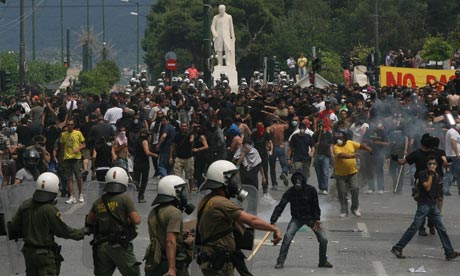Europe warned of financial chaos over Greek debt crisis
![]()
Greek prime minister fails to form unity government as police battle rioters in Athens and shares tumble over default fears
Ian Traynor in Brussels, Helena Smith in Athens

Protesters face riot police during an anti-austerity demonstration near parliament in the centre of Athens. With the Greek government facing collapse, Europe is warned of financial chaos. Photograph: Panagiotis Tzamaros/AFP/Getty
Greece’s 18-month sovereign debt crisis brought the government to the brink of collapse as public fury over savage austerity measures erupted in pitched battles with riot police on the streets of Athens.
The escalation of the Greek crisis had instant European and global impact, sending world stocks tumbling and exposing European Union paralysis over whether and how to launch a second attempt in a year to save Greece from insolvency.
George Papandreou, the socialist prime minister, announced he would seek a vote of confidence on a new government after offering to resign and broker a new national unity coalition with opposition conservatives.
He admitted failure after intense but fruitless negotiations with the conservative New Democracy party aimed at engineering a consensus behind the massive public spending cuts and wholesale privatisation programme – moves deemed necessary to secure a second bailout from the European Union and International Monetary Fund.
The opposition called for Papandreou’s resignation and a renegotiation of the bailout terms with the EU, the European Central Bank, and the IMF as the price for its assent to a national coalition.
Earlier, riot police clashed with tens of thousands of demonstrators protesting in the capital against the radical austerity measures being imposed to try to secure a new bailout expected to amount to around €100bn.
Following the fall of the Irish and Portuguese governments in recent months after driving their countries into bankruptcy, it appeared that the eurozone’s worst crisis was claiming another scalp. Despite the heightening sense of urgency, EU governments, the ECB, and the European Commission remained gridlocked over how to respond to the debt emergency, which pushed Greece closer to sovereign default and Europe towards a fresh banking crisis.
The ECB warned that a Greek default could spark “contagion” across Europe, causing Greek banks to implode and inflicting major damage on the big banks in France and Germany.
“It looks like a week of chaos,” said a European official in Brussels. An emergency meeting of the 17 eurozone finance ministers on Tuesday failed to bridge the differences over how to construct a second bailout for Greece, senior EU diplomats said. In May last year the EU and the IMF put together a €110bn bailout for Greece, the first in a single currency country. That experiment has failed. Ireland and Portugal have since also needed to be rescued from national insolvency.
“The euro area faces a very challenging situation that comes mostly from the interconnection of the sovereign debt crisis and the situation of the banking sector,” the ECB said. “Greece could have a contagion effect,” added Vitor Constancio, an ECB vice-president.
Papandreou’s offer of a national unity government signalled he was throwing in the towel because of an inability to push through the tens of billions in spending cuts, tax rises, and privatisation progress needed to secure the international bailout.
Europe’s peripheral debt crisis has also taken a heavy political toll in the richer creditor countries of the eurozone, with anti-bailout populists making big gains in Finland and the Netherlands. The German Chancellor Angela Merkel has also suffered political setbacks at home while coming in for searing criticism abroad for her handling of the emergency.
The Americans too are exasperated with the failure of the big EU states to resolve the crisis and fear for the impact of a Greek default on the international economy. Greek borrowing costs soared to record levels as investors took fright.
Stock markets suffered; the Dow Jones industrial average in Wall Street was down 180 points, and FTSE 100 was down 60 points.
Berlin, backed by the Dutch, Austrians, and Finns, have been arguing for weeks that there can be no new bailout of Greece without the country’s private creditors being forced to suffer losses on their loans. Otherwise, they argue, European taxpayers will be shouldering the costs while the international banks pocket the proceeds.
-
The ECB, the European Commission and other EU countries led by France argue that this could pave the way to disaster, with the financial markets decreeing the compulsory “haircuts” on private bondholders a Greek default, a “credit event” that could lay waste to the single currency.
“We are against any sort of default with haircuts and any form of private-sector event that could lead to a credit event or a rating event,” Constancio said.
There was little sign that the differences had been bridged at Tuesday’s emergency meeting of eurozone finance ministers.
They meet again in Luxembourg on Sunday under pressure to strike a deal on a new Greek rescue by 20 June, ahead of an EU summit next Thursday.
But yesterday in Brussels diplomats said it could take weeks, perhaps until mid-July, to reach agreement. Amid a sense that the Greek drama was moving towards a European denouement, all eyes were on a summit between Merkel and the French president, Nicolas Sarkozy.
Related Articles
EU ha matado a cientos de civiles con drones, denuncian AI y HRW
![]()
Letta Tayler, investigadora de Human Rights Watch, señaló que desde 2009 Estados Unidos ha perpetrado unos 80 ataques con drones
Kony 2012: Los derechos humanos como perversión colonial
![]()
Crónicas desde el corazón de la bestia Kony 2012: Los derechos humanos como perversión colonial Luis Martín-Cabrera Rebelión La semana
The Obama regime
![]()
Es una práctica profundamente arraigada que los gobiernos opuestos a la dominación norteamericana sean rutinariamente caracterizados como “regímenes” por los


